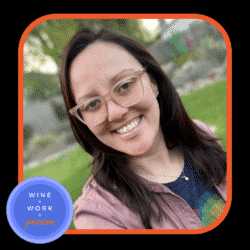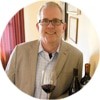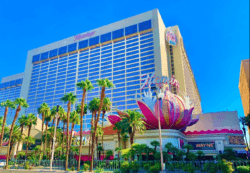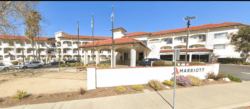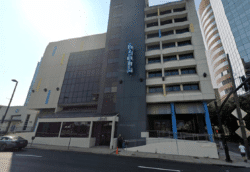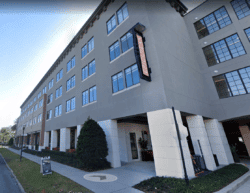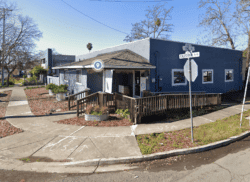Welcome to the Wine, Work & Passion Podcast where our mission is to help you turn your passion for wine into a career.
In this special episode, we’ll talk to Morgan Bailey, Hospitality Director at Quintessa Winery, about the surge in available wine jobs as wineries reopen and the busy season approaches. Morgan will share her experience and expertise and offer advice on how you can find and secure a job right now in wine hospitality.
Book a career coaching session with Karen: https://go.oncehub.com/KarenWetzel
Karen Wetzel: Today, I’ll talk to Morgan Bailey. She’s the hospitality director at the majestic Quintessa winery in Napa Valley. A few weeks ago when I was visiting Quintessa. Morgan. And I got to talking and we discussed this podcast. We also talked about the [00:01:00] tremendous need to fill open positions that are available right now on the hospitality side of the wine industry.
And that was the inspiration for this interview. As our wineries are reopening and our busy seasons approaching the job market here in Napa is really heating up and finding qualified candidates to fill all the positions that were lost earlier in the year because of the pandemic is a real challenge.
This means there are job opportunities for everyone to that end, Morgan will share her experience and expertise of the hospitality side of the wine industry. And she’ll talk about the types of roles that you might find at a prestigious property, like when Tessa be sure and stay tuned until the end when Morgan will give us actionable insights about how you can enter the world of wine.
By working in high-end hospitality. And now let’s get to our interview.
Welcome, Morgan, can you please tell the audience who you are? Where do you work? What do you do in the wine industry?
Morgan Baily: [00:02:02] Thank you so much for having me, Karen. My name is Morgan Bailey and I’m the hospitality director at Quintessa
Karen Wetzel: [00:02:09] state. Great. So just to set the table for the audience, Morgan and I met while she and a few coworkers were taking a class for me, a WSET level two class at the Napa Valley Wine Academy.
And they were nice enough to invite me out to Quintessa for a tasting. And of course, you don’t say no to the stunning reputation of Quintessa. So of course, I went and it did not disappoint the views, the wine, the hospitality, it was all just really amazing. And during that visit, Morgan and I got talking about her role and wine jobs and that light bulb went off over my head and I said, boy, this would make a great podcast.
So here we are. So Morgan, thanks for agreeing to join me today. And. To helping our audience really discover your world. So can you tell us your story? How did you get started in the wine industry? What led you [00:03:00] here? So give us the beginning from soup to nuts.
Morgan Baily: [00:03:02] Yeah. Okay, perfect. I am one of those weird people who knows.
They want to work in hospitality. A lot of people just fall into it, but it’s something that I knew I wanted to do from an early age. I started working in the restaurant industry. I worked at a restaurant in mill Valley. And I did everything from hosting to running food. And then I went to college for hospitality at Boston University.
When I had finished there, I went to culinary school in Pasadena because I thought that’s what I wanted to do. And I ended up while I was in school reading about a company called hospitality. So it’s a boutique hotel company based out of San Francisco. And I started working with them and I worked for them for 13 years, starting out as a breakfast server at one of their smaller hotels in Tiburon.
Moving from breakfast server, doing housekeeping, working the front desk, really anything that they needed I would do. So I moved up to the operations track. I’ve worked at the Del Sol in San Francisco, the mill Valley in. [00:04:00] Patella Diageo and then eventually transferred to Chicago and an opportunity came up in Chicago to be an assistant general manager and open the hotel Lincoln.
So that was a really great experience. Yeah. A lot different, a lot colder for sure. Really cool experience to get, to spread my wings, learn a little bit more about the industry, and live in a new city. While in Chicago, I worked in the hotel as the assistant GM. I helped with a few transitions and openings, a couple in DC, and ended up working at Chicago.
The athletic association is the hotel manager, which is a huge hotel. That’s a landmark. So really interesting, a really neat food and beverage component right on Michigan Avenue on Lake Michigan. And worked at the Talbot hotel and made my way back to Napa Valley or this area. So I grew up in San Rafael and I ended up moving back here to be closer to my family.
My parents live in San Fe and when I moved back, I said, okay, well, what do I want to [00:05:00] do? I want to work. And I wanted to work at either Meadowood or Oberto. So Obera this delay had an opening for the director of operations, which was really kismet because the director of operations had been there for five years.
So I wasn’t really sure what was going to happen, but that role ended up opening up. And I was lucky enough to work at Obera for about a year and a half as director of operations. And being a Napa. I knew, I mean, I love wine, so I have a strong affinity for wine and you just learn about it by osmosis being here and working in a luxury environment too.
You need to know a bit about wine, talk to guests about it and make great recommendations while I was there. Bearish is actually right across the street from when Tessa. So we would have a lot of protests. I knew a lot about Quintessa and their hospitality director role open. And I had a friend who worked here and I said, wow, what a cool opportunity.
So I came over, [00:06:00] interviewed did the experience and was so lucky to have landed this role. So now I’ve been at Quintessa as a hospitality director since November,
Karen Wetzel: [00:06:10] 2019. I have to say, knowing your history. Now you have set your sights very high in your life. When you say you were looking at either Meadowood or Opus for those people in the know that listening to the podcast who don’t know Napa very well.
Those are really the two most prestigious. Resorts here in that buy, you really can’t get any more elegant or any more well-known or more prestigious than both of those properties. And then Quintessa from the wine side is they’re equal. They’re right up there with some of the most iconic prestigious wineries here in the Valley.
So you have traveled in good company. My dear, I love that. I love that. That’s awesome. Tell us a little bit about quintessence. What is it all about? Cause one of the things we want to focus on today obviously is not just [00:07:00] Quintessa, but how do you move into positions in the wine industry, in these prestigious properties?
Because it, quintessence is not alone. So why don’t you talk a little bit about Quintessa and the history and what it’s all about and that’ll help us move on. Yeah.
Morgan Baily: [00:07:15] So Quintessa is the name of the estate, the wine, and the spirit of the land, essentially. So we’re located in about the bird. So we’re on up to 180 acres where 160 of that is planted to vine each year.
Our vision truly is to create a wine that expresses the diversity of the land and transforms the soil, the vines, the climate, all of the energy into something greater and larger than those parts. Singularly. So we farmed biodynamically and organically. So each vintage is really an opportunity for us to learn about the nuances of the land’s personality, as well as how it reacts to different conditions of each vintage.
So it’s really a magical place and we have some [00:08:00] beautiful wine
Karen Wetzel: [00:08:01] and beautiful estate. I know you make two wines, but you really only make one wine. That was the namesake. And now I know you’ve added a white wine, but it’s really just great. Bordeaux blend, right? Yes,
Morgan Baily: [00:08:13] absolutely.
Karen Wetzel: [00:08:14] Yeah. So you don’t come and get the whole flight like you do some of the other properties where you’re doing peanut, Award all the way to Cabermnet and some chard and Sauvignon Blanc.
It really is a winery that has built its entire reputation on this one. Really iconic style of wine. That’s so revered. And now I know you added a Chardonnay. Can you tell us a little bit about , the founders?
Morgan Baily: [00:08:36] Yeah. So Augusta and Valaria are our founders and their property was purchased in 1989.
So this property prior to becoming queen Tessa. Was land that was Virgin land, essentially. It was from number RDP and family. There was a previous owners and basically, the parents had passed away and the children were looking to sell the land, but it’s such a special [00:09:00] piece of land. It had gone in escrow 11 different times.
So Phelps wanted it. Stags Leap wanted it. And the children met with Valaria and they said, we have to sell this to her. We want her to have the
Karen Wetzel: [00:09:13] land. Well, first of all, it’s shocking that that amazing piece of property had not yet been planted that in of itself was shocking. When I learned that that’s pretty impressive.
Morgan Baily: [00:09:23] I know. So after that, the land was planted for Valaria, they have to lay in roots until a Valaria had worked in a vineyard there and was able to out here really transformed Quintessa, and we farmed biodynamically. So our first vintage was in the early nineties and the visitor center was then built in 2002.
And really when the mindset that we’re stewards of the land, even down to the architecture, the architecture was Walker Warner. And when you’re driving on the Silverado trail, the building is cut to honor the nuances of the land as opposed to trying to change it. So [00:10:00] everything we do here is to honor and support and guide as opposed to change.
Karen Wetzel: [00:10:06] Yeah. It’s not the big palaces that you see, the big chateaus that you see up and down highway 29, for sure. It has its own. It really does blend so nicely. And with the landscaping, it’s almost hard to find because of that. I know. Thank God for the signage. So that helps a lot. That’s right. Well, that’s great.
So you started off in management there, right?
That was your first position as manager. Yes. What types of positions are there either at Quintessa or properties like Quintessa, what types of roles are there speaking more for front of the house? Not so much the wine-making side, but from the front-of-the-house standpoint, the hospitality side and sales.
What types of roles are there? Properties like Quintessa?
Morgan Baily: [00:10:48] Yeah. So at Quintessa, we’re a lean team at Quintessa. Basically, we have our visitor center hosts. That’s essentially like a wine educator. We have our support team members. We [00:11:00] have a membership concierge and then we have reservations. So I’ll explain to you what each of those roles do essentially.
So the visitor center host is really somebody who. You’re welcoming guests to the estate. It’s our job to educate the guests in a way that’s meaningful to them. We’re not teachers, but we’re here to guide guests through Quintessa and elimination, and the history and unimportant characteristic of that role is to be able to read guests and gauge their level of wine knowledge or their desire to deeply dive into terroir.
Or if they’re interested in talking about what to pair the wine with like it’s a lot of versatility. The host also does more than just guiding guests. We help set up. There’s a bit of grit and grace, I always say to the role, that’s a good way to put it. Yeah. So in hospitality, it’s, especially in a luxury environment.
It takes a lot of hard work to make [00:12:00] sure that all of the details are the I’s are dotted and the T’s are crossed, but it’s also being able to spend some really quality time with guests. So the visitor hosts is extremely important. And I think I told you before that we, as Nunez has a company, we promote.
Taking your WSETs. So that’s how I met you. Obviously, my whole team here is interested in taking the WSET. Doesn’t matter what level I started WSET level one, and now I’m at two, and it’s been really fun and interesting because we can study together, but we’re learning. And that’s important for guests as well, that the guest wants to know about what they should try in Sonoma and why we want to be able to talk to them about that or what wine is similar.
To Quintessa in different parts of the world. So that’s important. We have our support team as well. Our support team, they worked so hard. That team is setting up the tastings, breaking down the tastings, really a Jack of all trades. We’re [00:13:00] helping pull orders for guests. And again, it’s guest-facing, you’re not necessarily hosting.
It’s a really great entry-level role because again, by osmosis, they’re in all of the training that we do, they’re tasting the 2018 contests that they’re doing verticals. We’re learning about the land, the terroir, et cetera. So support role is critical.
Karen Wetzel: [00:13:19] Sounds a little bit like a back waiter, almost the back way to roll.
Morgan Baily: [00:13:22] Yep. That’s exactly what it’s like. And then our membership concierge. We have a hybrid role here. It’s a membership concierge and reservationist, and that role is very, guest-facing critical to our success because it’s the first voice that you hear on the other end of the phone. And when you’re a member and you pick up the phone and you have a question about your order, or you want to know something about your current order, you call the membership concierge.
So that’s really your liaison. So that role is there’s some wine knowledge that needs to be known for that role. And then also just. A very somebody who can interface well with guests [00:14:00] and make them feel like they’re family.
Karen Wetzel: [00:14:03] The wine education piece is not as critical I would assume. Or am I wrong? That in the concierge, the reservations, the knowledge of wine, isn’t as important as say the wine host, who’s really engaging with the customer from the minute they get there until the minute they leave and talking specifically about wines.
Would you say that’s true?
Morgan Baily: [00:14:22] Yeah, I think that our members, if you are working reservations and you’re a member concierge, our members are familiar with wine. So actually you do get a lot of questions because our members are, you don’t necessarily stumble on fantastic. People have either had it in a restaurant or spend gifted to them.
So there’s some knowledge there. So it is important for the reservationist and membership concierge to know, and also that role. We’ll host some of our members as well.
Karen Wetzel: [00:14:49] Now you mentioned WSET and I know a lot of you have taken it and continue to take it. Is there other types of on-the-job training and in other words, if you haven’t gotten to the WSET yet, first of all, is it required to be hired, or is that something that you can pick up after you’ve started working?
I guess that’s the first question. And then the second part of that question is what type of training, whether it’s skills training on how to serve, or if it’s actual wine knowledge, does a person get on the job?
Morgan Baily: [00:15:17] WSET is certainly not required to be hired, but it’s certainly encouraged continuously improving yourself as a wine educator, which I think is so important.
Some of the, on the job training that we have here, given that I come from a guest services background, we’ve implemented the Forbes standards from a Meadowood from an Oak bearish, from a five-star property. We’ve taken some of those standards and implemented them here. So things and experiences now for guests are more intangible.
So it’s really about the feeling that they have when they’re on property, they want to feel cared for. They want to feel that the host was thoughtful and they want to feel that they want to return. So a lot of the training that we do. Is we actually any [00:16:00] hosts that comes on, we try to do the gauge it, right?
If you’ve been a wine host for a long time, we will certainly cater your training, but it’s important that you get full contested experience when you come on as a team member. So the assistant manager, and I will sit down and go through all of the standards with you and the standards can range from really tactical things.
So greeting a guest by their name, using their name and when to use it down to the details of the glassware, how the glassware should look cause there are some basics, but those need to be met. And then we’ll also train you on the intangibles. So how to read a guest, how to anticipate their needs. And then we do go through, we have a wonderful veterinary Academy that’s put on by harness and you learn.
Many different aspects of the industry. So finance, we have a finance training. We do monthly training with our general manager and our winemaker. And that is probably one of the most exciting training because we’ll hear it from the winemakers. Now, what her thoughts were her thoughts on different vintages and how it’s tasting.
And there’s a [00:17:00] lot of different trainings that we’ll do. But when you’re hired, we really try. Even if you want to get out there and host right away, we really want you to spend time. With each of our hosts with the managers, with the support team members. So you can really understand. What each role does because then once we cut you loose, we want to make sure that you can all work together really well,
Karen Wetzel: [00:17:21] And you have to be able to speak to the wine and to the region.
And to answer questions seems like WSET is like augment that so well, but your training is very focused on specifically your property, which is great. If you’re a wine host, how many groups, how many reservations would you see in a typical day during the busy part of the season?
Morgan Baily: [00:17:42] Yeah, so we have three. Time slots per day. So the experience is 90 minutes. Typically we have three experiences, but the average amount of time for experiences about 90 minutes. So each host will see approximately three groups per day. We have a few [00:18:00] experiences where you may see two groups at one time, sometimes members come and they want a bit more of a hands-off experience.
Sometimes we have just a seated tasting as opposed to a tour, but typically you see three groups per day. I mean, you have 90 minutes with your guests, so
Karen Wetzel: [00:18:16] yeah, that’s a long time.
Morgan Baily: [00:18:19] But there’s a lot to talk about. So we try to prep the night before so that when we’re in service, things can be pretty seamless and we’re by appointment only.
However, if we have availability, we’ll take same-day reservations, but we try to be prepared. So guests have a great.
Karen Wetzel: [00:18:34] Right. Well, I know when my husband and I came, the best really was Michael was our wine host. And it was great because we felt incredibly pampered of course, and very well taken care of. But Michael had that perfect touch of being there when we needed him and giving us all the information he offered and that we wanted to answer every question, but he also had this sort of knack of just.
Quietly [00:19:00] backing away and just waiting for the right moment to come back so that we had hi, I’m really talking among ourselves. And we, in fact, there was another table next to us that was in a different stage of their tasting and struck up a conversation with them. And so we had all that time, but it was like, he was really orchestrating a perfect experience for us and behind the scenes, kind of the man behind the curtain.
But then right there when we needed it, it was really remarkable. And I don’t think people really realized, thought that goes into handling a guest experience in a way that makes it so memorable and so special. And that’s really what we come to expect it a property that’s so iconic and prestigious, but it isn’t always delivered.
So that’s pretty cool. I think that we got to experience that. Thank you. So working for Quintessa or another prestigious property, what are the benefits? What would really make a purse out aside from the fact that you’re in [00:20:00] this gorgeous property and getting to taste fantastic wines and learning as you go, but some other benefits, like what are the personal benefits?
What are the tangible benefits that can be offered?
Morgan Baily: [00:20:11] You learned? So much about not just contested, but Napa Valley. We’re very close with the winemaker and our production team. So we learn all about the wine making process. We’re there during harvest, and that’s a really unique, wonderful experience and its own.
Also, I think that being encouraged to take your WSET from a company standpoint to me, that’s awesome.
Karen Wetzel: [00:20:33] Very few companies do it truly.
Morgan Baily: [00:20:35] Yeah. And it’s fun to do it with your team members too. And different people bring in bottles of wine and you try to blind taste it and they have fun and you talk through why you taste certain things. So that’s really great too. Also at Quintessa, we have a wine allocation program. So you receive a certain $1,200 for full-time team members, $600 for part-time team members, and that’s an annual benefit. So that’s pretty [00:21:00] wonderful. Yeah. So that’s a really unique, wonderful benefit. And then your standard benefits of medical, dental vision, but very good benefits.
Karen Wetzel: [00:21:12] No, that’s important. That’s very important. When you’re hiring somebody, let’s say you have some openings and I’m guessing you probably do. As we ramp up here for a season. What are you really looking for? What kind of skills are you looking for in a person and a candidate for a, say a wine host job or really any of the jobs you’ve described?
Morgan Baily: [00:21:30] I would say the first thing is somebody who’s passionate. And when I say passionate, it doesn’t necessarily mean that you are a diploma candidate and all you care about that is wine. I think that’s very important and there’s a component to that that I love, but it’s also passionate about guest service.
So. It’s wanting to be a part of someone’s experience in a really genuine that’s something that we look for prior experience is important, but also I think the [00:22:00] technical experience can always be trained. So for me, it’s more about how you connect with guests. Who are you? Where do you want while you’re here with guests?
And are you truly invested in the guest experience? Are you passionate about Quintessa? A lot of our hosts who are here will say I went to Quintessa. I knew I needed to work there and it is, they love the wine, but it’s also just being here. It’s such a magical place. We’re looking for people who can take that sentiment and share it with guests.
Karen Wetzel: [00:22:29] Absolutely. So then I think people are listening might be thinking, Oh, you mean, I don’t have to have my WSET level three or diploma. There is opportunity, even though I might not have a credential to work at such an amazing place. And I think that that’s important. So in your mind then, would you say experience comes first more important than credentials?
Morgan Baily: [00:22:51] I don’t mean to give a wishy-washy answer, but I think there’s room for both. I really do. I think that experience is important and why [00:23:00] knowledge is important. I don’t know which one is more important than the other, but I think you need to have a zest and care about wine and be passionate about wine if you’re crazy enough to work in hospitality.
But I think that it’s some of both, so I have a complete hotel and restaurant background as opposed to. Wine background, but I have a passion for wine. So we have team members who have a passion for wine who have grown to love hospitality. So I think there’s room for both.
Karen Wetzel: [00:23:28] Yeah. And I tell them my coaching clients and a lot of our students who ask about getting into the industry. If you don’t have any experience, then credentials help. They maybe crack that door open that may not have been open. But I also tell people, look, when you say. Do you have experience, okay. Maybe you don’t have experience working at a winery, but do you have experience waiting on tables or working in a hotel? I mean, there’s other ways to look at experience besides just pouring wine for somebody or serving wine to someone. [00:24:00] And that’s sort of the point of this whole podcast. This whole concept of our podcast is to show people that there are other ways to get in. And that, like you say, you can teach people. About wine. You can teach people technical things. You can’t teach passion. That’s something that I learned a long time ago. You have to have that burn in your belly, that fire in your belly to really be successful. And those are the things can be really overcome. Let’s talk about what else besides skills and experience do you look for in a prospective appointment?
Is it personality? Is it linguistics? Is it, I don’t want to say their physical look cause we’re not allowed to look at that, but just their presentation, the way they present, like a presentation skills, somebody’s a good communicator. Are those things useful? And do you look for those things actively?
Morgan Baily: [00:24:48] Absolutely articulation is very important. Polish poise, professionalism. That’s very important, especially in a luxury environment. So being able to make a guest [00:25:00] feel welcome and being familiar with guests is desirable. Whereas being casual is not, if that makes sense. But it’s still, you know, I know my experience here in generally, I find that everybody has that wine country casual feel to it in the sense that they’re not buttoned up in a suit and tie now presenting tableside, but it is the information, the communication that is polished and that needs to cause you, the person is paying for a luxury experience that needs to be presented as such, without being stuffy or intimidating.
Karen Wetzel: [00:25:32] That was another thing I noticed with Michael. I know a lot about wine, but my husband, not as much. And he asks a lot of questions and he was very comfortable. He never once felt like he was ignorant or silly for asking the question. So I think all those things are very important.
Morgan Baily: [00:25:47] I think you touched on something. That’s a really great point. So when I say polished professionalism employs those things were definitely not somewhere that stuffy. I think that’s a really important piece and [00:26:00] it really goes back to how you define luxury. Luxury to me, at least is going somewhere and not wanting anything else. When you’re there you say, this is exactly what I want and I don’t want to be anywhere else. This has exceeded my expectations.
Karen Wetzel: [00:26:17] That’s a great way to put it. Yeah.
Morgan Baily: [00:26:18] Thanks. I think that that’s what we try to translate here. And a lot of that goes to how you read the guests. For example, if you are. Rattling off a ton of technical terms that really intimidates the guests who were doing the guest of a disservice.
So to be able to read the guests, to be able to walk through, to connect with the guests and walk them through the wines in a way that’s meaningful to them, to where they find a connection to the estate and the connection to the wine that I think is the definition truly of luxury. So that’s how we try to.
Work with the team members to really find that connection. And it’s tough because it’s intangible. Right?
Karen Wetzel: [00:26:55] Well, it kind of goes back to what you were saying a little bit earlier when [00:27:00] you were talking about connecting with that guest and how important that is because you can be a master of wine or a master Somalia and know everything there is to know about wine or at least what there is in the moment.
But not be able to translate that into hospitality. And there are jobs for people that have that skill, but that doesn’t translate into your needs and a high-end property. Like when Tessa, you have to have that balance of both. And I know I always laugh. I would tell my students this, I tell my fellow teachers this as well.
My fellow educators, sometimes as educators, we have to be careful because we can do more to scare people away than to bring them in right than to welcome them. And we get off on a tangent and it’s. Great to show off your wine chops, but this is not that type of position. This is a position to cater to, like you say, understanding the guests needs.
And yeah, if somebody wants to come in and geek out, you need to be able to do that. But to be honest, I don’t know how you feel, but I really feel that most of the people [00:28:00] coming to Napa are looking more to learn than to talk. Now you do get the person who’s going to want to show off their wine shops and they should be able to do that.
They want to show what they know and that’s. Wonderful. But most people here are looking for you to educate them. So they walk away with those nuggets of knowledge, that information that they didn’t have before they walked in the door. I think that’s so important. Yeah. And that’s where credentials like WSET and just even self study and all the training you give them that all comes into play.
All those little things you pick up and can impact on your guest. Right? Absolutely. I think that’s important. I have a couple more questions for you. One is. How long have you been in the industry now? I forget. What year? You said you started.
Morgan Baily: [00:28:42] Oh, that’s gonna say how old I am.
Karen Wetzel: [00:28:45] So just the wine industry. You don’t have to go back.
You’re alive, younger than me. So there you go.
Morgan Baily: [00:28:53] So I’ve been at Quintessa since 2019
Karen Wetzel: [00:28:56] , 2019. Okay. So just a couple of years and because so much has [00:29:00] changed in the last. Two years. What are you seeing as far as changes in the industry, whether it’s diversity or need for credentials or just the consumer coming in the door?
Of course, we haven’t had a lot of consumers coming in the door, I guess, with COVID, but what’s the demand for high-end wines like Quintessa, or tell me what you’ve seen from a skill set or changes you’ve seen in the industry.
Morgan Baily: [00:29:24] I think one of the things that I’ve noticed the most, even from working in a resort to coming here, but the main trend being it’s experience-based, and for us, we have such a beautiful product.
It’s imperative that our service matches our product and the experiences that we offer are unique. And we’ll have a lot of value to guests and members. So. We have our quintessential experience where you’re in the pavilion, overlooking the estate, which is amazing.
Karen Wetzel: [00:29:53] Yes, I got to do it, but I got to see the pavilion. Wow. It’s like being in a glass-enclosed bird’s nest looking over [00:30:00] this amazing property. It was just beautiful.
Morgan Baily: [00:30:02] Maybe previously, it was about things being about the product really just about the wine and how the wine was. But now it’s really about the experience and it’s about all of the intangibles and forming a genuine connection with your host and with the property.
And I think that more and more we’re seeing that people want different experiences.
Karen Wetzel: [00:30:22] Yeah. And I think that’s true really of the hospitality industry in general, if you go out to eat now, you’re not just going out to eat to fill your belly. You want that to be the entertainment or the experience for the evening.
Back in the day, we used to go dinner and a movie. Well, we don’t do that anymore. Dining experience is the event. So I think that that translates very much into the wineries. I want to leave our guests. I’d like for you to leave our guests with some recommendations, some things that you look for that they can focus on as they decide whether or not this type of work is right for them.
So can you give us a few bullet points if you [00:31:00] will.
Morgan Baily: [00:31:01] First one is to be yourself. I think genuine. Authentic be who you are. And that’s really important because you and you’re joining our team. We’re hiring you for who you are. So how your history has led you up to who you are today and bringing your wine knowledge and bringing your experience, whatever that might be, but always being genuine to who you are, because that really shines through with the guests.
And it’s also really difficult to keep up appearances. I would say authenticity. And I look for that to create like a nice diverse team. So I would say one is be yourself, always be true to who you are. The next thing I would say is. Continuous improvement. So how are you moving forward in your life? How are you improving who you are?
I always say that’s really interesting. And I’m curious to know. And is it through your wine knowledge? Are you taking the WSET? Are you reading on your own? Are you learning about soil types? Are you taking an Excel class? What are you doing to [00:32:00] improve yourself? I always think that that’s. Really interesting.
And that shows me a desire to grow and learn. And that’s important to me. So I would say continuous improvement and then maybe the most important is excellence. And that’s how do you define excellence and how does that translate to your interactions? With guests. So what’s the perfect experience look like.
And how do you strive for excellence in all of your interactions with your guests and your team members? And I usually kind of want to hear examples, but those are the commonalities that I’m listening for in an interview, because I think those are really important pillars to being a solid visitor center host or hospitality professional, really.
Karen Wetzel: [00:32:43] Yeah. And I liked that you included not just excellence toward your guests, but also toward other team members, because especially in an environment like a Quintessa in that luxury environment, like you said mentioned, it’s a small team. Everybody plays a few roles and that. Really does translate to the guest [00:33:00] ultimately. And I think that that’s very, very important. So as we wrap this up, Morgan, this is such an important time for Napa. We’ve taken it on the chin pretty good. The last year, as I know the entire country has, but we got the double whammy of no tourism. And then we were on fire. So we’ve had a bad year here of a challenging year, I should say, maybe not a bad year, but a challenging year.
And it’s so exciting. I was watching, I got an email today from wine jobs.com and I’m a big fan of theirs. And there were 25 listings when two weeks ago there was like two. So it’s very exciting to see jobs opening up here and getting ready for a great summer season. The tourists are back, at least on the weekends.
We’re full. Are you guys pretty full on the weekends now?
Morgan Baily: [00:33:46] We’re almost back to summer levels. Summertime. Wow. People are so excited to be out and we are so excited to welcome them. Yes. Yes. We have visitor center, host positions open. We will be opening a [00:34:00] support position as well, maybe a couple, but we are ready to.
Welcome guests back. We’re already seeing such a spike in visitation and we couldn’t be happier.
Karen Wetzel: [00:34:11] That’s so awesome. It is very exciting. And it’s great because it’s also bud break. Let’s just start a popping out. So it’s like this really cool, exciting time. To be here in Napa. So whether you’re looking for a job, this is a great time to come to wine country, Napa Sonoma, wherever.
It’s a great time to look for work up here. It’s also if you’re just like experienced wine country, this is a beautiful time of year to come. It’s starting tomorrow with, we got nothing but seventies ahead of us and it’s going to be beautiful. So either way you can’t go wrong coming up to Napa for enjoyment or for employment, either one works.
Morgan. I really want to thank you for sharing your insights. I think it’s important for our audience to really open up their minds to all the different opportunities that there are, and that it sometimes doesn’t take the requirements they think, but it takes other [00:35:00] things they hadn’t anticipated. And I think that that’s really good for them to know and to help them really pursue their dreams and all of that.
That’s what this podcast is all about. So thank you very much for joining me today.
Morgan Baily: [00:35:12] Thank you so much for having me, Karen. Great. And I hope the audience has a wonderful visit to Napa soon and go to Quintessa, you will never be sorry. Thank you so much. Thanks Morgan. Take good care.
Karen Wetzel: [00:35:29] Thanks so much for joining me today on wine work and passion. I hope our show has inspired you to follow your passion for wine and find a job in our dynamic industry. Our goal is to make this podcast all about you. So we’d love to hear your suggestions for wine job-related guests or topics. You can submit your ideas by emailing [email protected] as always.
If you enjoyed the program, we’d appreciate a good review on iTunes, and feel free to share wine work and passion with anyone that could benefit from it. Thanks again for listening and we’ll see you again. Next time.

